When it comes to our furry friends, we always want the best for them, especially when it comes to their health. As a dog owner, you may have encountered situations where your furry friend needs eye drops. Whether it is a mild irritation or something more severe like an infection, administering eye drops can be challenging.
You may have wondered “can you use human eye drops on dogs?”. The short answer is no. This article will discuss whether human eye drops are safe for dogs and provide information on alternatives.
Dog eyes are not similar to human eyes when it comes to structure and function. Dogs’ eyes have a different physiology than humans’ eyes; thus, using human medication on a dog’s eyes can lead to dangerous side effects or worsen the condition they are experiencing. Also, some human medications might contain ingredients that are toxic or harmful to dogs.

Importance of Knowing Whether Human Eye Drops Are Safe for Dogs
It is essential as a pet owner to understand that what works for humans may not work for dogs. The wrong choice of medication can lead to adverse reactions, worsen the condition or result in blindness in severe cases. In some instances, using human medication without consulting your veterinarian might cause irreversible damage that requires surgery.
Administering medication wrongly can stress your dog. It might harm your bond. Knowing if human eye drops are safe for dogs can save you money. This can help avoid unnecessary vet visits.
Deciding to use human eye drops on dogs needs careful thought. You must consider symptom severity and underlying conditions. Always consult with a vet first. They can diagnose and prescribe the right medication.
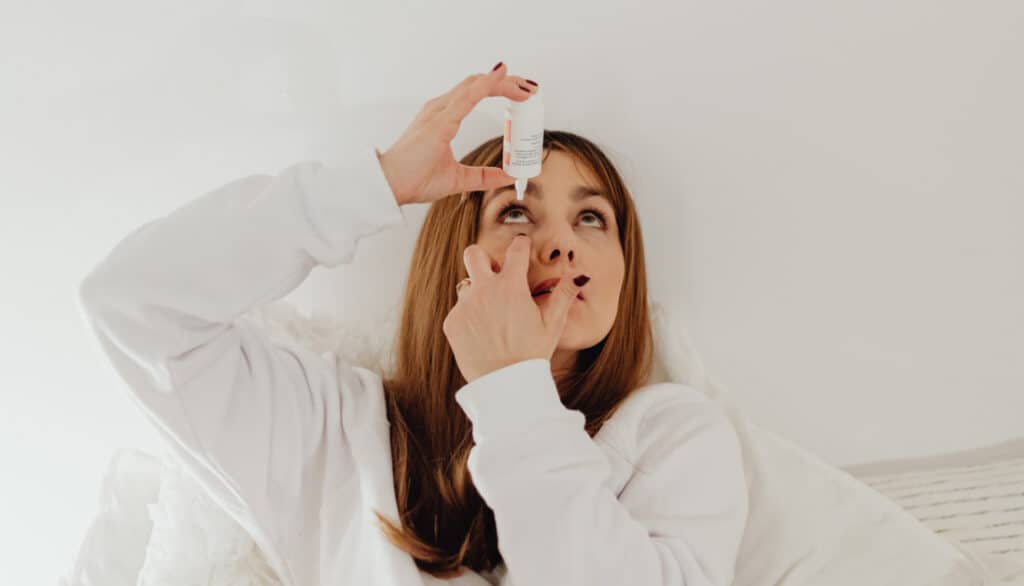
Can You Use Human Eye Drops on Dogs?
As a pet owner, it’s natural to want to help your furry friend when they’re exhibiting signs of discomfort. One common issue dogs face is eye irritation, which may lead you to wonder if you can use human eye drops on them. Unfortunately, the answer is no – using human eye drops on dogs is not recommended.
The Differences Between Human and Dog Eyes
The primary reason why human eye drops should not be used on dogs is that our eyes are different from theirs. For starters, the pH levels in our eyes differ; human eyes have a neutral pH level of around 7 while dog eyes have a slightly acidic pH level of around 6.5.
This difference can cause irritation for dogs when exposed to products formulated for humans. Another significant difference is the structure of our eyes versus theirs.
Humans have more developed tear ducts that aid in lubrication, whereas dogs rely on their third eyelid for this function. Additionally, the shape and position of their eyes are different than ours and may affect how medicine or foreign substances interact with their eyes.

Why You Should Avoid Using Human Eye Drops on Dogs
While it may be tempting to reach for your own eye drops when your dog appears to be experiencing discomfort, doing so can lead to several issues. Human eye drops frequently contain chemicals that could harm your dog’s sensitive eyes or even exacerbate their condition.
For example, many human eye drops include preservatives such as benzalkonium chloride that obstruct oil glands in the eyelids and damage ocular surfaces over time when applied repeatedly. Other chemical ingredients such as steroids can suppress the immune response in your dog’s body and make infections worse instead of better.
Safer Alternatives for Treating Dog Eye Irritation
Fortunately, there are safe alternatives specifically formulated for dogs you can use to treat eye irritation. Be sure to look for products with dog-friendly pH levels, and avoid any containing ingredients that could be harmful to your dog. One popular option is saline solution, which can help flush out debris or foreign substances from your dog’s eyes.
Additionally, some veterinary ophthalmologists recommend using artificial tears specifically formulated for dogs. These products may also include beneficial vitamins and minerals that can help improve your dog’s overall eye health.

Natural Remedies for Dog Eye Irritation
If you prefer natural remedies for minor irritations, there are options. You can try chamomile tea bags or diluted witch hazel compresses. Applying coconut oil around the eyes is another method. You can also make a saline solution. Use purified water and sea salt for this.
These natural remedies may not be potent as specialized dog eye drops. But they can soothe mild irritation. This could be caused by allergies or environmental factors.
The Importance of Consulting with Your Veterinarian
Ultimately, the best course of action when dealing with any health issue concerning your furry friend is to consult with your veterinarian. They can examine your pet’s eyes thoroughly and recommend safe treatment options based on their specific needs.
Remember that while it may be tempting to self-diagnose and treat your pet at home, doing so could lead to more substantial issues down the line. Trust in the expertise of veterinary professionals when it comes to your pet’s health and well-being.
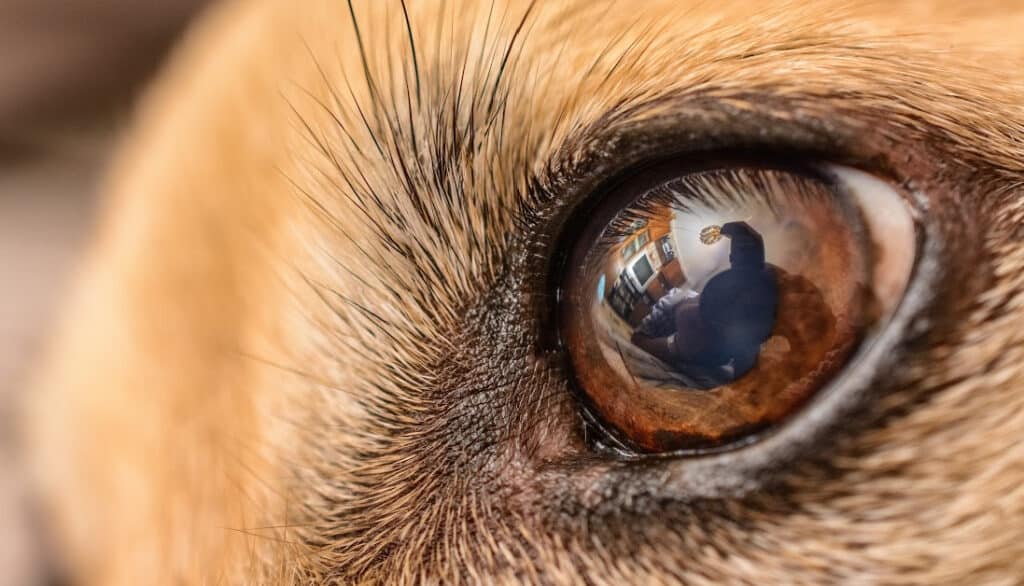
What Happens If You Use Human Eye Drops on Dogs?
Using human eye drops on dogs is not recommended. There are differences between human and dog eyes. Human eye drops can potentially cause harm and worsen the condition of your dog’s eyes. It is essential to understand the possible side effects and risks before using human eye drops on dogs.
Possible Side Effects of Using Human Eye Drops on Dogs
One of the potential side effects of using human eye drops on dogs is irritation. The ingredients in human eye drops may be too strong for dogs’ eyes, causing discomfort, redness, or even pain. Some may also experience an allergic reaction to the medication.
Another possible side effect of using human eye drops on dogs is corneal ulcers. If a dog has a pre-existing condition such as dry eyes or abrasions, using inappropriate medication like human eye drops can cause further damage to their eyes.

Risks Associated with Using Human Eye Drops on Dogs
The biggest risk associated with using human eye drops to treat your dog’s eyes is that it can worsen their condition. For example, if you use steroids meant for humans in your dog’s eyes without appropriate guidance from a veterinarian, it could lead to glaucoma (increased pressure within the eyeball). In some cases, using these medications without appropriate supervision by a veterinarian could lead to blindness.
Another risk associated with using inappropriate medication is that it can mask underlying issues that need medical attention. For instance – redness caused due to allergy might be temporary relief due to the usage of steroids but underlying infection might still be present which needs medical attention.
How Using Human Eye Drops Can Worsen Your Dog’s Condition
Using inappropriate medication can worsen your dog’s condition rapidly in many different ways. As mentioned earlier – It can cause corneal ulcers, allergic reactions, and irritation. Long-term usage of steroids might lead to cataracts and glaucoma.
Additionally, improper usage of medication without proper guidance could negatively impact their vision permanently. If your dog has an underlying medical condition or is taking other medications, using human eye drops can interact with the other treatment methods leading to further complications.
Human eye drops are not designed for dogs and can potentially cause harmful side effects if used inappropriately. Always consult your veterinarian before administering any medication.
There are specific medications available that are designed explicitly for dogs’ eyes and are safe to use when given adequate guidance from a veterinarian. So keep your furry friend’s eyes healthy by using appropriate medication!
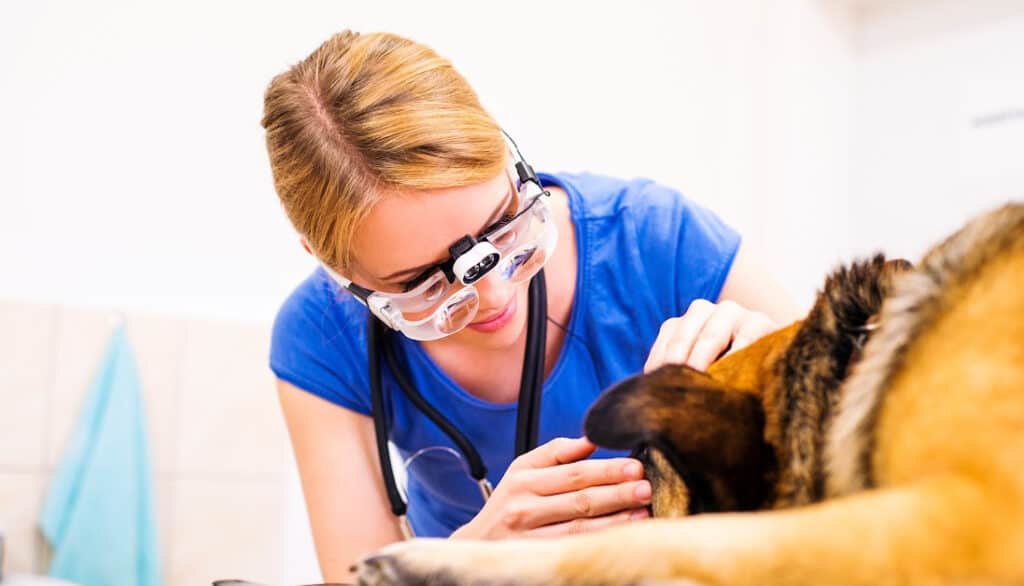
Alternatives to human eye drops for dogs
When it comes to treating eye conditions in dogs, there are several safe and effective alternatives to using human eye drops. In fact, using these alternatives can be a better option than risking the potential side effects of using human medication on your pup’s eyes.
One popular alternative is veterinarian-prescribed topical ointments. These ointments are specifically designed for use in dogs and are formulated with ingredients that are safe for their eyes.
The ointments can be applied directly to your dog’s eyes, and they provide long-lasting relief from a variety of eye conditions like infections, allergies, and inflammation. Another option is saline solution or artificial tears.
These solutions mimic the natural tears produced by your dog’s eyes and can help flush out debris or irritants that may be causing discomfort or infection. Saline solution can also be used as a preventative measure to keep your dog’s eyes clean and healthy.
For minor irritations or mild infections, you may also consider using natural remedies like chamomile tea bags or a diluted mixture of apple cider vinegar and water. Chamomile has anti-inflammatory properties that can soothe irritated eyes while apple cider vinegar has antibiotic properties that can help fight off infections.
In some cases, dietary changes may also help improve underlying eye conditions in dogs. For example, adding omega-3 fatty acids to their diet may help reduce inflammation in their eyes and improve overall eye health.
Safe and effective options for treating various eye conditions in dogs
Several options exist for treating dog eye conditions. The choice depends on the issue’s cause. For instance, your dog may have conjunctivitis, or pink eye. Here, a vet might prescribe an antibiotic ointment.
Additionally, cleanliness matters. Keep your dog’s eyes clean. Wipe them with a warm, damp cloth. Also, avoid any irritants that could cause discomfort.
If your dog has dry eye (also known as keratoconjunctivitis sicca), your veterinarian may recommend a combination of topical medication and dietary supplements to help stimulate tear production. They may also suggest using artificial tears or other lubricating solutions to keep your dog’s eyes moist.
For dogs with allergies, avoiding the allergen is usually the best course of action. However, if avoidance is not possible, antihistamines or steroid eye drops may be prescribed to provide relief from symptoms like itching and inflammation.
Natural remedies that can help with minor irritations
In addition to chamomile tea bags and diluted apple cider vinegar, there are several other natural remedies that can help soothe minor eye irritations in dogs. One option is pure honey. Honey has natural antibacterial properties that can help fight infections while also providing moisture to dry eyes.
To use honey for your dog’s eyes, simply dilute it in water and use a dropper to apply the solution directly into their eyes. Another option is coconut oil.
Coconut oil has antimicrobial properties that can help fight off infections while also moisturizing dry or irritated eyes. To use coconut oil for your dog’s eyes, gently warm it up until it becomes liquid and then use a dropper to apply a small amount directly into their eyes.
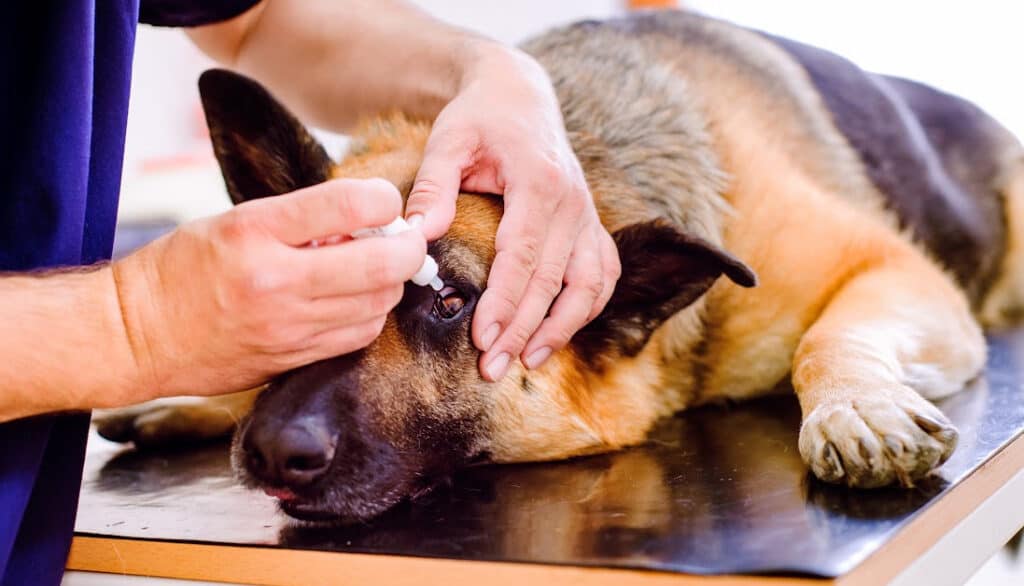
How to Administer Eye Medication to Your Dog
Why Proper Administration is Important
Administering eye medication to your dog can be a daunting task, but it is important to do so properly in order to ensure that your furry friend gets the appropriate dose and achieves the desired results. The right dosage is critical for treating various eye conditions, ranging from minor irritations to more severe infections.
Administration mistakes can worsen the condition or even lead to permanent damage. So it’s essential for pet owners to understand how best to administer eye medication in a safe and effective manner.
Preparation and Safety Precautions
Before starting, make sure you have all of your supplies handy. This includes the medication prescribed by your vet, any applicators or droppers that come with it, tissues or gauze pads to clean excess discharge or residue from around the eye area, and treats for afterwards! It’s also important that you wash your hands thoroughly with soap and water before administering any medication.
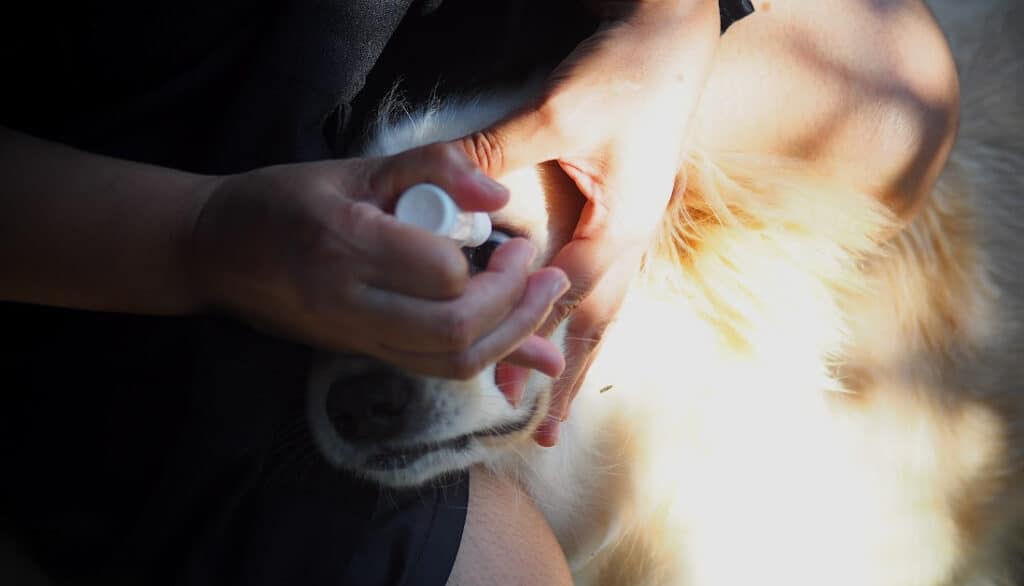
Techniques for Administering Eye Drops
One of the most common ways of administering eye drops is by using an eyedropper or syringe. Start by tilting your dog’s head back slightly and gently pulling down on their lower eyelid with one hand.
With the other hand, hold the dropper just above their lower eyelid and carefully squeeze one drop into their eye. Make sure that none of the tip touches their eyelashes or eyeball.
Another technique involves applying pressure directly under your dog’s eyes using your thumb and forefinger while placing a different finger on top of their head between both ears. This will cause them to look up which will create space underneath their eyelids resulting in an easier application process.
Importance of Following Dosage Instructions
It cannot be stressed enough how important it is to follow dosage instructions carefully. Your vet will prescribe a specific amount of medication for your dog based on weight, age, and the severity of their condition. Giving too much or too little medication can have harmful consequences.
If you are unsure about anything or if you think you may have made a mistake during administration, contact your veterinarian immediately. Administering eye medication to your dog at home may seem daunting at first but with proper preparation and techniques it can be done safely and effectively.
Remember that each dog is unique and what works for one may not work for another, so don’t hesitate to reach out to your vet if you are having any issues or concerns with administering eye drops. Always follow the prescribed dosage instructions closely to ensure that your furry friend gets the care they need in order to achieve optimal health.
Recap of Main Points
So, we have covered a lot of ground in this article discussing whether or not it is safe to use human eye drops on dogs. To recap, we have learned that using human eye drops on dogs is not recommended due to differences in the composition of human and dog eyes.
Human eye drops can contain ingredients that are harmful to dogs and may cause further damage to their eyes. Additionally, using human medications on dogs can lead to serious side effects and worsen the condition you were trying to treat.
It’s important to always use medications specifically designed for dogs and follow dosage instructions carefully. We’ve also explored some alternatives to using human eye drops on dogs, such as safe and effective options for treating various eye conditions in dogs, including natural remedies that can help with minor irritations.

Final Thoughts on Using Human Eye Drops on Dogs
While it may be tempting to try using your own eye drops on your furry friend, it’s important always to consult with a veterinarian before administering any medication or treatment. Your vet will be able to advise you on the best course of action for your dog’s specific needs based on their medical history and current condition. It’s also essential always to follow proper administration techniques when giving medication or other treatments.
This includes washing your hands before and after handling medication, ensuring proper dosage amounts are given, and avoiding touching the dog’s eyes directly as much as possible. Remember that prevention is always better than cure.
Regular check-ups with a veterinarian can help keep your dog healthy by catching any potential issues early. Maintaining good hygiene practices around the eyes can also help prevent some common eye problems in dogs.
While it may seem like a quick fix at times, using human eye drops on your dog is not worth risking their health. Always speak with a veterinarian before administering any treatments or medications and explore safe and effective alternatives to ensure your furry friend stays healthy and happy.
~Lindsie
